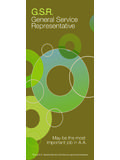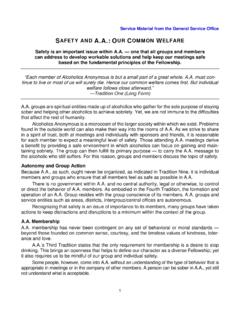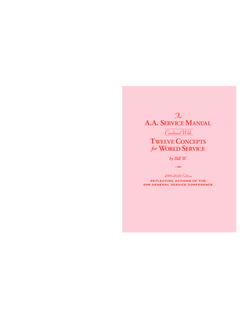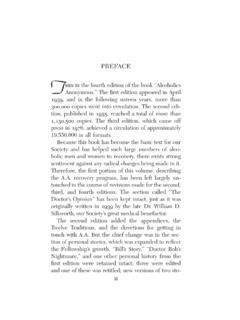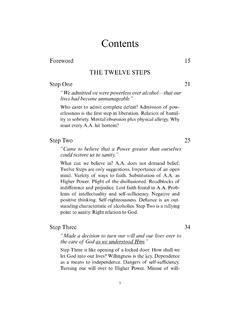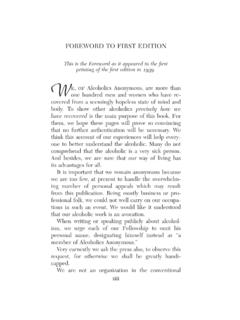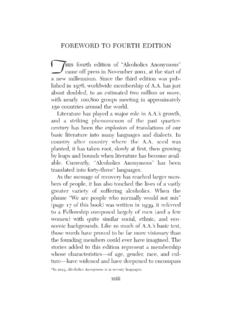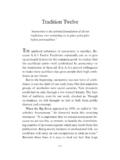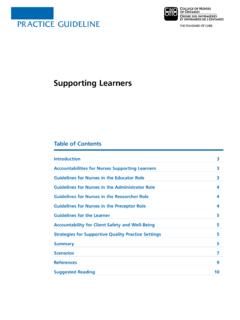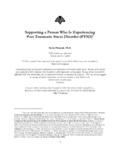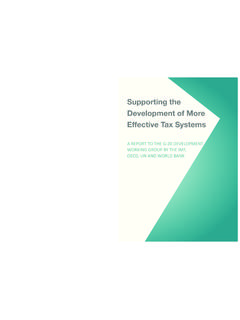Transcription of Twelve Traditions - Tradition Seven - (pp. 160-165)
1 160 Tradition Seven Every group ought to be fully self- supporting , declining outside contributions. SELF- supporting alcoholics? Who ever heard of such a thing? Yet we fi nd that s what we have to be. This principle is telling evidence of the profound change that has wrought in all of us. Everybody knows that active alcoholics scream that they have no troubles money can t cure. Always, we ve had our hands out. Time out of mind we ve been dependent upon somebody, usually money-wise. When a society composed entirely of alcoholics says it s going to pay its bills, that s really no Tradition had the labor pains this one did. In early times, we were all broke.
2 When you add to this the habitual supposition that people ought to give money to alcoholics trying to stay sober, it can be under-stood why we thought we deserved a pile of folding mon-ey. What great things would be able to do with it! But oddly enough, people who had money thought otherwise. They fi gured that it was high time we now sober paid our own way. So our Fellowship stayed poor because it had was another reason for our collective poverty. It was soon apparent that while alcoholics would spend lavishly on Twelfth Step cases, they had a terrifi c aversion to dropping money into a meeting-place hat for group Tradition SEVEN161purposes. We were astounded to fi nd that we were as tight as the bark on a tree.
3 So , the movement, started and stayed broke, while its individual members waxed are certainly all-or-nothing people. Our reac-tions to money prove this. As emerged from its infan-cy into adolescence, we swung from the idea that we need-ed vast sums of money to the notion that shouldn t have any. On every lip were the words You can t mix and money. We shall have to separate the spiritual from the material. We took this violent new tack because here and there members had tried to make money out of their connections, and we feared we d be exploited. Now and then, grateful benefactors had endowed clubhouses, and as a result there was sometimes outside interference in our affairs.
4 We had been presented with a hospital, and almost immediately the donor s son became its principal patient and would-be manager. One group was given fi ve thousand dollars to do with what it would. The hassle over that chunk of money played havoc for years. Fright-ened by these complications, some groups refused to have a cent in their these misgivings, we had to recognize the fact that had to function. Meeting places cost something. To save whole areas from turmoil, small offi ces had to be set up, telephones installed, and a few full-time secretaries hired. Over many protests, these things were accomplished. We saw that if they weren t, the man coming in the door couldn t get a break.
5 These simple services would require small sums of money which we could and would pay our- Tradition SEVEN162selves. At last the pendulum stopped swinging and pointed straight at Tradition Seven as it reads this connection, Bill likes to tell the following pointed story. He explains that when Jack Alexander s Saturday Evening Post piece broke in 1941, thousands of frantic let-ters from distraught alcoholics and their families hit the Foundation* letterbox in New York. Our offi ce staff, Bill says, consisted of two people: one devoted secretary and myself. How could this landslide of appeals be met? We d have to have some more full-time help, that was sure. So we asked the groups for voluntary contributions.
6 Would they send us a dollar a member a year? Otherwise this heartbreaking mail would have to go unanswered. To my surprise, the response of the groups was slow. I got mighty sore about it. Looking at this avalanche of mail one morning at the offi ce, I paced up and down ranting how irresponsible and tightwad my fellow members were. Just then an old acquaintance stuck a tousled and aching head in the door. He was our prize slippee. I could see he had an awful hangover. Remembering some of my own, my heart fi lled with pity. I motioned him to my inside cu-bicle and produced a fi ve-dollar bill. As my total income was thirty dollars a week at the time, this was a fairly large donation.
7 Lois really needed the money for groceries, but that didn t stop me. The intense relief on my friend s face warmed my heart. I felt especially virtuous as I thought of all the ex-drunks who wouldn t even send the Foundation * In 1954, the name of the Alcoholic Foundation, Inc., was changed to the General Service Board of Alcoholics Anonymous, Inc., and the Foundation offi ce is now the General Service Offi SEVEN163a dollar apiece, and here I was gladly making a fi ve-dollar investment to fi x a hangover. The meeting that night was at New York s old 24th Street Clubhouse. During the intermission, the treasurer gave a timid talk on how broke the club was. (That was in the period when you couldn t mix money and ) But fi -nally he said it the landlord would put us out if we didn t pay up.
8 He concluded his remarks by saying, Now boys, please go heavier on the hat tonight, will you? I heard all this quite plainly, as I was piously trying to convert a newcomer who sat next to me. The hat came in my direction, and I reached into my pocket. Still working on my prospect, I fumbled and came up with a fi fty-cent piece. Somehow it looked like a very big coin. Hastily, I dropped it back and fi shed out a dime, which clinked thinly as I dropped it in the hat. Hats never got folding money in those days. Then I woke up. I who had boasted my generosity that morning was treating my own club worse than the distant alcoholics who had forgotten to send the Foundation their dollars.
9 I realized that my fi ve-dollar gift to the slippee was an ego-feeding proposition, bad for him and bad for me. There was a place in where spirituality and money would mix, and that was in the hat! There is another story about money. One night in 1948, the trustees of the Foundation were having their quarterly meeting. The agenda discussion included a very important question. A certain lady had died. When her will was read, it was discovered she had left Alcoholics Anonymous in trust with the Alcoholic Foundation a sum of ten thou- Tradition SEVEN164sand dollars. The question was: Should take the gift?What a debate we had on that one! The Foundation was really hard up just then; the groups weren t sending in enough for the support of the offi ce; we had been tossing in all the book income and even that hadn t been enough.
10 The reserve was melting like snow in springtime. We needed that ten thousand dollars. Maybe, some said, the groups will never fully support the offi ce. We can t let it shut down; it s far too vital. Yes, let s take the money. Let s take all such donations in the future. We re going to need them. Then came the opposition. They pointed out that the Foundation board already knew of a total of half a mil-lion dollars set aside for in the wills of people still alive. Heaven only knew how much there was we hadn t heard about. If outside donations weren t declined, abso-lutely cut off, then the Foundation would one day become rich. Moreover, at the slightest intimation to the general public from our trustees that we needed money, we could become immensely rich.
